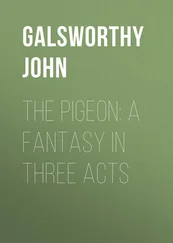John Galsworthy - The Patrician
Здесь есть возможность читать онлайн «John Galsworthy - The Patrician» — ознакомительный отрывок электронной книги совершенно бесплатно, а после прочтения отрывка купить полную версию. В некоторых случаях можно слушать аудио, скачать через торрент в формате fb2 и присутствует краткое содержание. Жанр: foreign_antique, foreign_prose, на английском языке. Описание произведения, (предисловие) а так же отзывы посетителей доступны на портале библиотеки ЛибКат.
- Название:The Patrician
- Автор:
- Жанр:
- Год:неизвестен
- ISBN:нет данных
- Рейтинг книги:5 / 5. Голосов: 1
-
Избранное:Добавить в избранное
- Отзывы:
-
Ваша оценка:
- 100
- 1
- 2
- 3
- 4
- 5
The Patrician: краткое содержание, описание и аннотация
Предлагаем к чтению аннотацию, описание, краткое содержание или предисловие (зависит от того, что написал сам автор книги «The Patrician»). Если вы не нашли необходимую информацию о книге — напишите в комментариях, мы постараемся отыскать её.
The Patrician — читать онлайн ознакомительный отрывок
Ниже представлен текст книги, разбитый по страницам. Система сохранения места последней прочитанной страницы, позволяет с удобством читать онлайн бесплатно книгу «The Patrician», без необходимости каждый раз заново искать на чём Вы остановились. Поставьте закладку, и сможете в любой момент перейти на страницу, на которой закончили чтение.
Интервал:
Закладка:
“Unfortunately we don’t, Rimall,” he said; “we ought to, and we shall. I’ll take this book.”
Placing his finger on the print of the pagoda, he added: “A good symbol.”
The little bookseller’s eye strayed down the temple to the secret price mark.
“Exactly, my lord,” he said; “I thought it’d be your fancy. The price to you will be twenty-seven and six.”
Miltoun, pocketing the bargain, walked out. He made his way into the Temple, left the book at his Chambers, and passed on down to the bank of Mother Thames. The Sun was loving her passionately that afternoon; he had kissed her into warmth and light and colour. And all the buildings along her banks, as far as the towers at Westminster, seemed to be smiling. It was a great sight for the eyes of a lover. And another vision came haunting Miltoun, of a soft-eyed woman with a low voice, bending amongst her flowers. Nothing would be complete without her; no work bear fruit; no scheme could have full meaning.
Lord Valleys greeted his son at dinner with good fellowship and a faint surprise.
“Day off, my dear fellow? Or have you come up to hear Brabrook pitch into us? He’s rather late this time – we’ve got rid of that balloon business no trouble after all.”
And he eyed Miltoun with that clear grey stare of his, so cool, level, and curious. Now, what sort of bird is this? it seemed saying. Certainly not the partridge I should have expected from its breeding!
Miltoun’s answer: “I came up to tell you some thing, sir,” riveted his father’s stare for a second longer than was quite urbane.
It would not be true to say that Lord Valleys was afraid of his son. Fear was not one of his emotions, but he certainly regarded him with a respectful curiosity that bordered on uneasiness. The oligarchic temper of Miltoun’s mind and political convictions almost shocked one who knew both by temperament and experience how to wait in front. This instruction he had frequently had occasion to give his jockeys when he believed his horses could best get home first in that way. And it was an instruction he now longed to give his son. He himself had ‘waited in front’ for over fifty years, and he knew it to be the finest way of insuring that he would never be compelled to alter this desirable policy – for something in Lord Valleys’ character made him fear that, in real emergency, he would exert himself to the point of the gravest discomfort sooner than be left to wait behind. A fellow like young Harbinger, of course, he understood – versatile, ‘full of beans,’ as he expressed it to himself in his more confidential moments, who had imbibed the new wine (very intoxicating it was) of desire for social reform. He would have to be given his head a little – but there would be no difficulty with him, he would never ‘run out’ – light handy build of horse that only required steadying at the corners. He would want to hear himself talk, and be let feel that he was doing something. All very well, and quite intelligible. But with Miltoun (and Lord Valleys felt this to be no, mere parental fancy) it was a very different business. His son had a way of forcing things to their conclusions which was dangerous, and reminded him of his mother-in-law. He was a baby in public affairs, of course, as yet; but as soon as he once got going, the intensity of his convictions, together with his position, and real gift – not of the gab, like Harbinger’s – but of restrained, biting oratory, was sure to bring him to the front with a bound in the present state of parties. And what were those convictions? Lord Valleys had tried to understand them, but up to the present he had failed. And this did not surprise him exactly, since, as he often said, political convictions were not, as they appeared on the surface, the outcome of reason, but merely symptoms of temperament. And he could not comprehend, because he could not sympathize with, any attitude towards public affairs that was not essentially level, attached to the plain, common-sense factors of the case as they appeared to himself. Not that he could fairly be called a temporizer, for deep down in him there was undoubtedly a vein of obstinate, fundamental loyalty to the traditions of a caste which prized high spirit beyond all things. Still he did feel that Miltoun was altogether too much the ‘pukka’ aristocrat – no better than a Socialist, with his confounded way of seeing things all cut and dried; his ideas of forcing reforms down people’s throats and holding them there with the iron hand! With his way too of acting on his principles! Why! He even admitted that he acted on his principles! This thought always struck a very discordant note in Lord Valleys’ breast. It was almost indecent; worse-ridiculous! The fact was, the dear fellow had unfortunately a deeper habit of thought than was wanted in politics – dangerous – very! Experience might do something for him! And out of his own long experience the Earl of Valleys tried hard to recollect any politician whom the practice of politics had left where he was when he started. He could not think of one. But this gave him little comfort; and, above a piece of late asparagus his steady eyes sought his son’s. What had he come up to tell him?
The phrase had been ominous; he could not recollect Miltoun’s ever having told him anything. For though a really kind and indulgent father, he had – like so many men occupied with public and other lives – a little acquired towards his offspring the look and manner: Is this mine? Of his four children, Barbara alone he claimed with conviction. He admired her; and, being a man who savoured life, he was unable to love much except where he admired. But, the last person in the world to hustle any man or force a confidence, he waited to hear his son’s news, betraying no uneasiness.
Miltoun seemed in no hurry. He described Courtier’s adventure, which tickled Lord Valleys a good deal.
“Ordeal by red pepper! Shouldn’t have thought them equal to that,” he said. “So you’ve got him at Monkland now. Harbinger still with you?”
“Yes. I don’t think Harbinger has much stamina.
“Politically?”
Miltoun nodded.
“I rather resent his being on our side – I don’t think he does us any good. You’ve seen that cartoon, I suppose; it cuts pretty deep. I couldn’t recognize you amongst the old women, sir.”
Lord Valleys smiled impersonally.
“Very clever thing. By the way; I shall win the Eclipse, I think.”
And thus, spasmodically, the conversation ran till the last servant had left the room.
Then Miltoun, without preparation, looked straight at his father and said:
“I want to marry Mrs. Noel, sir.”
Lord Valleys received the shot with exactly the same expression as that with which he was accustomed to watch his horses beaten. Then he raised his wineglass to his lips; and set it down again untouched. This was the only sign he gave of interest or discomfiture.
“Isn’t this rather sudden?”
Miltoun answered: “I’ve wanted to from the moment I first saw her.”
Lord Valleys, almost as good a judge of a man and a situation as of a horse or a pointer dog, leaned back in his chair, and said with faint sarcasm:
“My dear fellow, it’s good of you to have told me this; though, to be quite frank, it’s a piece of news I would rather not have heard.”
A dusky flush burned slowly up in Miltoun’s cheeks. He had underrated his father; the man had coolness and courage in a crisis.
“What is your objection, sir?” And suddenly he noticed that a wafer in Lord Valleys’ hand was quivering. This brought into his eyes no look of compunction, but such a smouldering gaze as the old Tudor Churchman might have bent on an adversary who showed a sign of weakness. Lord Valleys, too, noticed the quivering of that wafer, and ate it.
Читать дальшеИнтервал:
Закладка:
Похожие книги на «The Patrician»
Представляем Вашему вниманию похожие книги на «The Patrician» списком для выбора. Мы отобрали схожую по названию и смыслу литературу в надежде предоставить читателям больше вариантов отыскать новые, интересные, ещё непрочитанные произведения.
Обсуждение, отзывы о книге «The Patrician» и просто собственные мнения читателей. Оставьте ваши комментарии, напишите, что Вы думаете о произведении, его смысле или главных героях. Укажите что конкретно понравилось, а что нет, и почему Вы так считаете.












